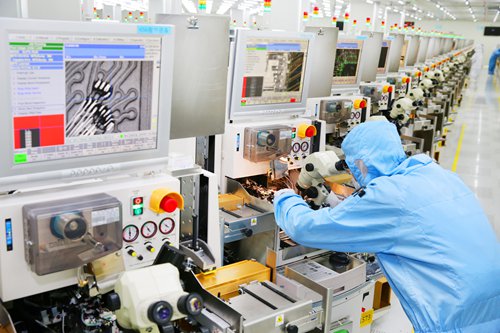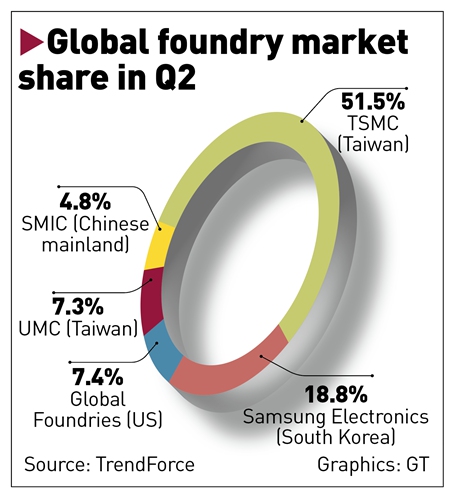SOURCE / INDUSTRIES
US eyes Taiwan as semiconductor factory that poses no threat: observer
Scheme to contain mainland risks paralyzing island’s pillar industry

An engineer analyzes chips at a chip factory in Nantong, East China's Jiangsu Province in February. Photo: VCG

xx
The US government said on Monday that it will launch an economic dialogue with the island of Taiwan, soon after which the Taiwan regional government reportedly expressed gratitude to the US for taking action to strengthen their economic ties.
However, experts said that the US sees the island only as a semiconductor manufacturing base that poses no threat to its technological hegemony, and they warned that the US' plot may paralyze Taiwan's pillar industry if the mainland shifts to South Korean microchips.
According to a statement on the American Institute in Taiwan's website, the annual Economic and Commercial Dialogue - led by US Under Secretary of State for Economic Growth, Energy and the Environment Keith Krach - would explore the full spectrum of the economic relationship such as semiconductors, healthcare and energy, with technology at the core.
Chinese mainland observers said that the US' main purpose is to exclude the Chinese mainland from access to the international semiconductor supply chain in its bid to contain the mainland's technological development, instead of what the US called a move to "bring real progress" to the US and the island of Taiwan through closer economic cooperation.
Apart from serving as a market for the US to dump agricultural products, the only value of the Taiwan economy and its companies for the US seems to be its semiconductor industry, which makes about 50 percent of the world's microchips, Ma Jihua, a veteran industry analyst, told the Global Times on Tuesday.
"The US owns core semiconductor technologies, while Taiwan-based foundries like TSMC are good at chip manufacturing. In this sector, Taiwan is complementary to the US, while posing no threat to the US' technological hegemony," Ma said.
He said that TSMC's plan to build a microchips factory in the US under the Trump administration's pressure implies the US' purpose of getting the island's chip production under its firm control in a bid to ban Chinese mainland's access to advanced chips.
With the semiconductor industry contributing about 15 percent of its GDP, Taiwan's dominance in this seemingly tiny but strategically important manufacturing makes it a natural target for the US amid its souring diplomatic ties with the mainland.
While the island of Taiwan is dreaming of bright economic prospects by strengthening cooperation with the US, its reliance on the huge market of the mainland means there is a lot at stake for the island.
Politicians in the island of Taiwan who continuously push for economic decoupling with the mainland for political gains, without considering the business community's interests, will find there are serious results, a Taiwan affairs expert who preferred to be anonymous told the Global Times on Tuesday.
Recently, Huawei reached an agreement with Taiwan-based semiconductor manufacturer MediaTek to supply more than 120 million chips to diversify its supplies amid a tough US chip ban, according to media reports.
The expert said that Chinese mainland imports $300 billion worth of microchips a year, of which about $60-70 billion come from Taiwan.
"The most advantageous industry for the island of Taiwan can become its biggest weakness," the expert said. "If the mainland shifts to chips made in South Korea or the mainland itself, the island's semiconductor industry would be paralyzed," the expert said, noting that history has proved that market demand is the most important factor for an industry's success.
"In early years when the island of Taiwan's industrial sector developed fast, many mainland businessmen rushed to the island to invest in the semiconductor sector to supply the mainland. Now faced with political headwinds, they may choose to directly invest in the mainland - in such locations as Shanghai and Xiamen, East China's Fujian Province," Ma said.


